Search results for tag "Video" - 10 answer(s)
90
Vote
The latest in the activities organized these past years around the exhibition of Ostad Elahi’s instruments at the New York Metropolitan Museum now include the full-length version of the film The Art of Ostad Elahi, featured on ostadelahi.com, Ostad Elahi’s official website.
Read more
1574
Vote
The principles of a correct education of thought are not matters of intellectual speculation: it is through practice that they bear fruit. But what does putting them into practice actually mean? Bahram Elahi answers this question by pointing out the dangers of overly abstract approaches to practice and self-transformation. It is not enough to consider the principles in theory, or even to self-suggest them daily with the best willpower in the world: in order to “concretely feel” them, we must pitch them against reality.
Read more
214
Vote
Dealing with others, enriching as it is, often comes along with a few of difficulties. Whoever they may be—a superior at work, a colleague, a member of our family, or a mere acquaintance—others rarely behave exactly like we would want them to, quite the opposite. A colleague stole the credit for my work again, a friend of mine hurt my feelings, my mother-in-law criticized my cooking again, … the list could go on. In such moments, it is only natural to feel the need to share our troubles with someone we feel close to and to seek their support. But here’s the catch: this legitimate need to confide in someone can very easily turn into the desire to speak ill of others. And, whether we are conscious of it or not, it often does. Then, all of a sudden, rather than sharing our difficulties, we start sharing what we think about others, including, if it can make us feel better, all the bad things we think about them…
Read more
311
Vote
Karen Armstrong is a historian of religion and the founder of the Charter for Compassion that has had far-reaching worldwide impact since its inception in 2009. The charter defines compassion as that attitude which “compels us to work tirelessly to alleviate the suffering of our fellow creatures, to dethrone ourselves from the centre of our world and put another there, and to honour the inviolable sanctity of every single human being, treating everybody, without exception, with absolute justice, equity and respect.”
Read more
559
Vote
Nested in the cocoon of our ego like silkworms, we are unaware of what we really are. Bahram Elahi develops the metaphysical as well as ethical implications of this striking image. The reality of the self consists in a plurality of functions and levels of consciousness in dynamic interaction, as illustrated—in figures—by the polarity between “surface conscious self” and “deep conscious self” (“inner guide”). Some key-ideas to help us break the cocoon…
Read more
577
Vote
A lecture and a series of concerts presented on 16 November 2014 at the Metropolitan Museum of Art in conjunction with the exhibition The Sacred Lute: The Art of Ostad Elahi are now available in video on the website of the museum. This “Sunday at the Met” features an introduction by Ken Moore, Curator in Charge of the Department of Musical Instruments, a lecture by Jean During, Director of Research at the Centre de Recherche en Ethnomusicologie and performances by the Garcia-Fons Quartet and Parissa and Ensemble.
Read more
444
Vote
Ken Moore, Curator in charge of the Department of Musical Instruments at The Metropolitan Museum of Art, gives a tour of the exhibition “The Sacred Lute: The Art of Ostad Elahi” on NYC-ARTS’s latest episode.
Read more
304
Vote
 This post is a follow-up to a previous post entitled “Ethics in a delicate situation: what do you think?”, which presented a hypothetical case study together with a poll, to which you can still participate if you haven’t done so yet (you might want to do so before reading further). Let us begin with a few remarks about the poll results: On both the French and the English versions of the site, choice e (There are no fundamental differences between helping others and devoting sufficient time to one’s spouse: Jack could have spent that evening exclusively with his wife and still be practicing ethics) has been by far the most popular, followed by choice b for the French version (The well-being of one’s spouse should always take precedence. It should be preferred to the well-being of others and even to one’s own well-being) and choice a for the English version (Efforts of generosity always meet obstacles that must be overcome to allow progress: Jack should have expected Kelly’s opposition and prepared himself better for this test in order to prevent any conflict).
Read more
185
Vote
Once we have discovered the divine ethical principles adapted to our time it is our duty to put them into practice, for only then will they nourish us and gradually become assimilated within us.
As we previously mentioned, a diet must fulfill certain criteria to be considered sound. Our physical organism, for example, requires a varied and balanced diet. Likewise, the practice of a divine ethical principle must fulfill certain conditions in order to have a positive effect on our psychospiritual organism:
(a) A divine ethical principle must be performed on a repeated basis. Only by repeatedly and persistently practicing an ethical principle will it gradually become integrated within our spiritual substance and eventually become part of our second nature. It is not by forcing ourselves to be generous on a few occasions, for example, that we can acquire the virtue of generosity; rather, we must repeatedly push ourselves to perform generous acts until the essence of generosity permeates our spiritual substance.
Read more
408
Vote
What is prayer? What function does it have in our lives and how do we practice it? E-ostadelahi.com drew a few questions on this theme from interviews conducted with six public figures. From the actor to the priest, to the intellectual, to the dancer, all answer these questions in their own words.
Following this video, you too will have the opportunity to define the personal meaning you give to prayer by participating in a short poll.
Read more
Next »
|

 News
News Podcast
Podcast

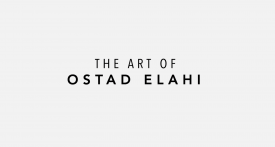
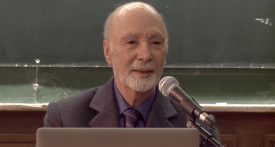

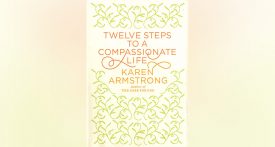
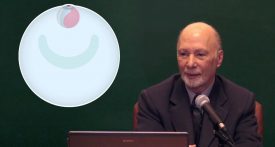

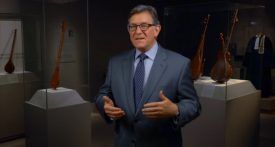

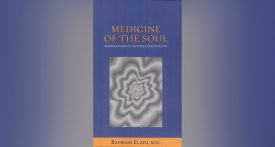
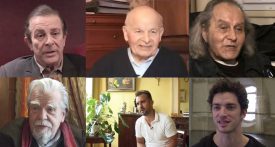


Recent Comments